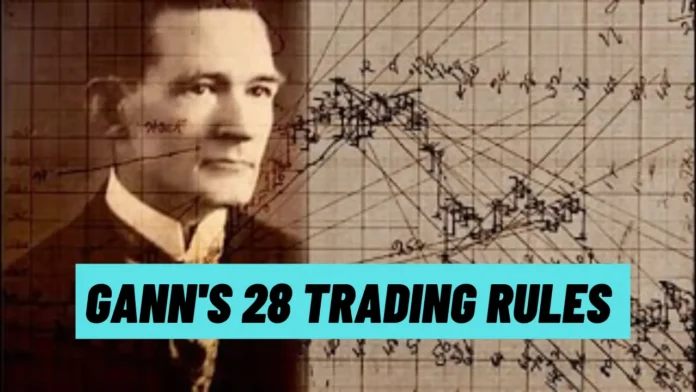William Delbert Gann was a legendary trader and market analyst, renowned for his precise trading strategies and innovative technical analysis methods. His work continues to influence traders worldwide, and his 28 trading rules remain a cornerstone for those seeking to navigate the financial markets successfully.
Importance of Trading Rules
Trading rules are essential for maintaining discipline, managing risk, and achieving consistent results. Gann’s rules, in particular, provide a comprehensive framework that can guide traders through various market conditions, helping them avoid common pitfalls and enhance their trading performance.
The Rules given below are based upon W. D. Gann’s experience :
1. Amount of capital to use: Divide your capital into 10 equal parts and never risk more than one-tenth of your capital on any one trade.
2. Use stop loss orders. Always protect a trade when you make it with a stop loss order.
3. Never overtrade. This would be violating your capital rules.
4. Never let a profit run into a loss. After you once have a profit (…), raise your stop loss order so that you will have no loss of capital.
5. Do not buck the trend. Never buy or sell if you are not sure of the trend according to your charts and rules.
6. When in doubt, get out, and don’t get in when in doubt.
7. Trade only in active markets. Keep out of slow, dead ones.
8. Equal distribution of risk. Trade in two or three different commodities, if possible. Avoid
tying up all your capital in any one commodity.
9. Never limit your orders or fix a buying or selling price. Trade at the market.
10. Don’t close your trades without a good reason. Follow up with a stop loss order to protect your profits.
11. Accumulate a surplus. After you have made a series of successful trades, put some money into a surplus account to be used only in emergency or in time of panic.
12. Never buy or sell just to get a scalping profit.
13. Never average a loss. This is one of the worst mistakes a trader can make.
14. Never get out of the market just because you have lost patience or get into the market
because you are anxious from waiting.
15. Avoid taking small profits and big losses.
16. Never cancel a stop loss order after you have placed it at the time you make a trade.
17. Avoid getting in and out of the market too often.
18. Be just as willing to sell short as you are to buy. Let your object be to keep with the trend and make money.
19. Never buy just because the price of a commodity is low or sell short just because the price is high.
20. Be careful about pyramiding at the wrong time. Wait until the commodity is very active
and has crossed Resistance Levels before buying more and until it has broken out of the zone of distribution before selling more.
21. Select the commodities that show strong uptrend to pyramid on the buying side and the ones that show definite downtrend to sell short.
22. Never hedge. If you are long of one commodity and it starts to go down, do not sell
another commodity short to hedge it. Get out of the market; take your loss and wait for
another opportunity.
23. Never change your position in the market without a good reason. When you make a trade, let it be for some good reason or according to some definite rule; then do not get out without a definite indication of a change in trend.
24. Avoid increasing your trading after a long period of success or a period of profitable
trades.
25. Don’t guess when the market is top. Let the market prove it is top. Don’t guess when the market is bottom. Let the market prove it is bottom. By following definite rules, you can do this.
26. Do not follow another man’s advice unless you know that he knows more than you do.
27. Reduce trading after first loss; never increase.
28. Avoid getting in wrong and out wrong; getting in right and out wrong; this is making
double mistakes.
When you decide to make a trade be sure that you are not violating any of these 28 rules
which are vital and important to your success. When you close a trade with a loss, go over
these rules and see which rule you have violated; then do not make the same mistake the
second time. Experience and investigation will convince you of the value of these rules, and
observation and study will lead you to a correct and practical theory for successful Trading in Commodities.

